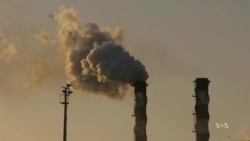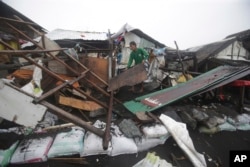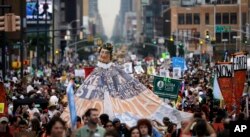A powerful typhoon in the Philippines, a three-year drought in California, accelerating ice melt in Antarctica: These were signs of global warming in 2014.
According to the Intergovernmental Panel on Climate Change Fifth Assessment, released this year, the planet is well on its way to a 2-degree-Celsius rise in temperature above pre-industrial times. Experts agree that would trigger irreversible change, including rising seas and more frequent and intense storms and drought.
Michael Oppenheimer, a professor of geosciences and international affairs at Princeton University and an author of the IPCC assessment, said that unless governments act now to reduce heat-trapping gases in the atmosphere, life on the planet could get much worse.
“If we are not judicious in our choices of what to do about restraining the emissions of the greenhouse gases," he said, "then by the end of the end of this century we could be several degrees Celsius warmer than we are now and put Earth in a condition that it has not seen in millions of years.”
While these predictions are grim, 2014 also brought some hopeful signs that the global community is beginning to take action on climate change.
The recent U.N. climate meeting in Lima, Peru, set the world stage for 2015, when nations will come together in Paris to sign a climate treaty to replace the Kyoto Protocol, which expired in 2012.
The delegates in Lima produced a draft text for the treaty and also pledged $10 billion to the Green Climate Fund that would help poor countries cope with climate change.
The preliminary agreement also broke with the past, committing developing countries like China and India to join the richer nations in cutting emissions. U.S. Secretary of State John Kerry acknowledged their responsibility: “More than half of global emissions are coming from developing nations. So it is imperative that they act, too.”
Also this year, the United States and China, the world’s top polluters, signed a historic agreement. Washington committed to reduce emissions between 26 percent and 28 percent by 2025, and Beijing put a timetable on its actions, saying emissions would peak by 2030.
Other countries are expected to put their numbers on the table by March.
In remarks at the Council on Foreign Relations in December, World Bank President Jim Young Kim said economic policy would be key to mobilizing global response.
“Unlike treaties of the past, the Paris agreement needs to speak as loudly of economic transformation as it does of pollution or carbon emissions targets,” he stressed.
The Paris meeting may provide the best chance ever to rein in emissions, he said, adding that national plans must put a price on carbon, reduce harmful subsides on fossil fuels, scale up renewable energy and capture carbon before it reaches the atmosphere.
Kim is impatient for action.
“We know if we do not confront climate change, there will be no hope of ending poverty or boosting shared prosperity,” he said. “Furthermore, the longer we delay in tackling climate change, the higher the cost will be to do the right thing for our planet and our children.”
In September, as 120 world leaders, including President Barack Obama, convened at U.N. headquarters in New York to discuss ways to tackle the growing threat of carbon pollution, the World Bank president joined 400,000 people in the street for the People’s Climate March. So did Princeton’s Oppenheimer, who said such events can help as countries move ahead to craft a new climate treaty.
“No matter what comes out of Paris," he said, "it is important that this problem be revisited continually to make sure that countries are living up to their commitments. And that means active and engaged citizenries in all these countries have to push, push, push on their governments.”
Delay is not an option, Oppenheimer said, warning that we are heading into an era that will become warmer, and warmer faster than at any other time in the history of civilization, unless steps are taken now to reverse the trend.







